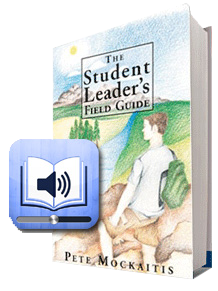6 Tips for Leaders with a Lack of Sleep
There’s one thing about college that has never changed, and probably never will: that age-old tradition, the all-nighter, or a lack of sleep in general. Even if we’re not up all night, looming deadlines for multiple projects at once means it gets harder and harder to get that 7-9 hours each night that our bodies crave. It’s no secret that a lack of sleep is bad for you. Lack of sleep is thought to contribute to obesity, diabetes, and even breast cancer, but nevertheless, despite such a strong case for sleep, student leaders will keep pushing themselves to the brink of what’s wakingly possible. We’ve already given our stern reprimand to those of you who consistently punish your sleep cycles with all the work you take on. So it’s with a clear conscience that we give you these tips for getting by on a lack of sleep.
Eat. A lot.
If you’re going to stay up all night or rise at the crack of dawn anyway, why not treat yourself to a nice, hearty breakfast? Really, though, that’s more of an order than a suggestion. If you’re going to go without sleep, you’ll need three square meals to do it. Don’t skip on your diet, and don’t eat junk either. To show you how serious we are about food, check out our next tip.
Snacks
Snacks are an easy and effective way to raise your energy levels during the lulls in your schedule. Avoid sweet foods that just give your blood sugar a temporary jolt and heavy greasy foods that will sap your energy. Proteins and complex carbohydrates such as those in fruit, nuts, granola, and cheese offer a sustained boost. Snacks can also fill in the gaps in your diet: if you pass on vegetables at dinner, an apple between meals can help balance things out. Skip on the fast food and swing by the grocery store produce aisle. Advanced tip: fiber helps your body release carbohydrates into your blood stream more efficiently, for longer lasting energy.
Hydration
When it comes to putting things in your body, water is as pure as it gets. There’s no sugar, no caffeine, no calories whatsoever, so what good can it do when you’re running on a lack of sleep? As an essential part of your diet, it simply helps your body do what it does more efficiently. And when you’ve had too much coffee, water helps rehydrate you, in addition to giving you something to fiddle around with in the thick of your caffeine buzz.
Naps
Napping is an art-form. Dedicated nappers:
- nap only for 15-20 minutes at a time
- make napping a habit
- use naps instead of other quick fixes for energy
Naps are a simple and often-overlooked remedy for a lack of sleep—usually because when we’re tired, we’re too pumped up with caffeine to give ourselves some rest in the middle of the day.
Coffee vs. Energy Drinks
And speaking of caffeine, what’s the healthiest way to imbibe it? A third of 12- to 24-year-olds report that they consume energy drinks regularly. They are a quick and sugar-loaded way to feel more awake, but researchers worry about the side-effects of overcomsumption, which include nausea, heart palpitations, and the negative feelings associated with the caffeine crash when the drinks wear off. In short, they’re a counter-productive way to survive on a lack of sleep.
Of course, seasoned coffee drinkers are aware of the downside of drinking too many cups—and too quickly—of coffee that’s way too strong. But evidence suggests that, in moderation, coffee consumption is linked to many benefits over one’s lifetime, including a longer lifespan.
Like so many other things in life, the trick is not to over-do it. Black tea is probably the healthiest way to get your caffeine supply, and it can be a refreshing change from the coffee binge brow-beating to which so many of us subject ourselves. But if you’re feeling bold, here’s another advanced tip: the caffeine nap. Guzzle some of your favorite coffee or tea drink, and lay down for a 15-minute snooze. As long as you wasted no time in finishing your beverage, you’ll wake up with the caffeine hitting your system at the same time. Talk about a boost.
Ain’t Too Proud to Beg
In extreme cases (and even in not-so-extreme cases), don’t be afraid to ask for help when you need it. There’s a misconception that asking for help is something leaders don’t do, but there’s a strong likelihood that some of your friends are capable leaders themselves, and you can trust them to carry through on part of a project for you. It’s totally fine to ask for help from fellow officers or organization members—it’s why they’re there in the first place. Your lack of sleep probably has something to do with staring down several deadlines at once, so if you’re dying for a reprieve, then consult with a teammate to see how they might help. Even the smallest contribution can do a lot to reduce your stress—and possibly buy you enough time for a nap on campus, preferably somewhere embarrassing.

 Email updates to sharpen your skills
Email updates to sharpen your skills
 Full-text PDF of my book
Full-text PDF of my book
 Full-audio MP3 of my book
Full-audio MP3 of my book
Leave a Reply